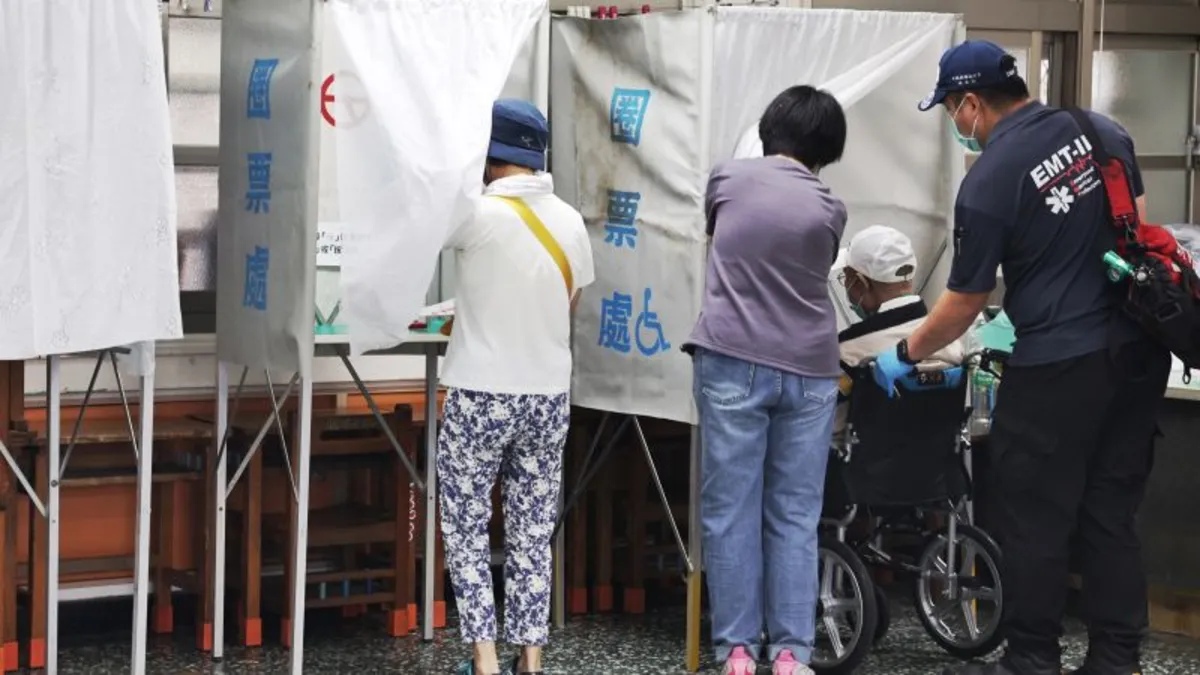
In a significant political event, Taiwanese voters decisively rejected a bid to oust approximately one-fifth of their lawmakers, specifically targeting members from the opposition Nationalist Party (KMT), during a recall election held on Saturday. This outcome dampens the hopes of the ruling Democratic Progressive Party (DPP) to gain a legislative majority on the self-governing island. The DPP, which leans towards independence, had celebrated its victory in last year’s presidential election, but the KMT, along with the smaller Taiwan People’s Party, still possesses enough seats to form a majority bloc.
According to official preliminary results, the recall efforts did not succeed in removing any of the two dozen KMT lawmakers targeted. This scale of the recall elections is unprecedented in Taiwan, with another seven KMT legislators facing similar votes scheduled for August 23. Currently, the KMT holds 52 seats in the legislature, while the ruling DPP has 51. For the DPP to achieve a legislative majority, they would need to remove at least six KMT lawmakers and secure victories in the upcoming by-elections, which must occur within three months following the announcement of results.
For a recall to be successful, more than a quarter of eligible voters in the electoral district must participate, and the number of votes in favor of the recall must surpass those against it. The poll closed at 4 p.m. local time, with Taiwan’s Central Election Commission set to announce official results on August 1.
If the results of next month’s polls are also unfavorable for the DPP, it could signify that the administration of Taiwan President Lai Ching-te will continue to face robust opposition within the legislature leading up to the next elections anticipated in 2028. KMT chairman Eric Chu remarked that voters had utilized their ballots to affirm the maturity of Taiwan’s democracy, urging an apology from Lai. “All Taiwanese people chose stability, opting for a government focused on practicality rather than engaging in divisive political battles,” he stated.
According to Professor Lev Nachman from National Taiwan University, those supporting the recall faced an “uphill battle” in unseating lawmakers from well-organized, KMT-dominated districts. The outcome complicates Lai’s ability to advance his policy agenda, especially with local elections approaching next year. “Currently, there is little Lai can do but explore creative ways to connect with the public,” he explained in an interview with the Associated Press.
One of the most notable lawmakers targeted by the recall, Fu Kun-chi, expressed that the election results leave Lai with no choice but to engage with the opposition and collaboratively seek a path for Taiwan to navigate the complexities of a chaotic international landscape. In a reflective statement, DPP Secretary-General Lin Yu-chang acknowledged the results, emphasizing that the recall should not merely be seen as a victory or defeat for political parties but as a demonstration of civic engagement. He stated that the DPP must more carefully consider public sentiment and adjust its approach to align with the expectations of the populace.
Supporters of the recall campaign have criticized the KMT and its allies for obstructing crucial legislation, particularly the defense budget, and for enacting controversial changes perceived as diminishing executive power while favoring China, which regards Taiwan as part of its territory. These actions have raised concerns among some Taiwanese regarding the integrity of the island's democracy and its capability to deter potential military threats from China, thus fueling the recall initiatives. Conversely, the KMT has accused the DPP of engaging in political retaliation after losing legislative control, claiming that the recall efforts undermine Taiwan’s democratic framework.
The recall election has exacerbated existing tensions between those who support maintaining the status quo and those advocating for enhanced relations with Beijing. Critics contend that politicians with pro-China sentiments are compromising Taiwan’s sovereignty and express concern over their interactions with mainland politicians. However, these politicians argue that such connections are essential for fostering dialogue, given Beijing’s reluctance to engage with the DPP. In comments regarding the recall election, Zhu Fenglian, spokesperson for China’s Taiwan Affairs Office, accused Lai's administration of striving for “one-party dominance” while masquerading as a democracy, as reported by state broadcaster CCTV. The mainland affairs council of Taiwan has also stated that Chinese authorities and state media have attempted to overtly interfere in the electoral process.